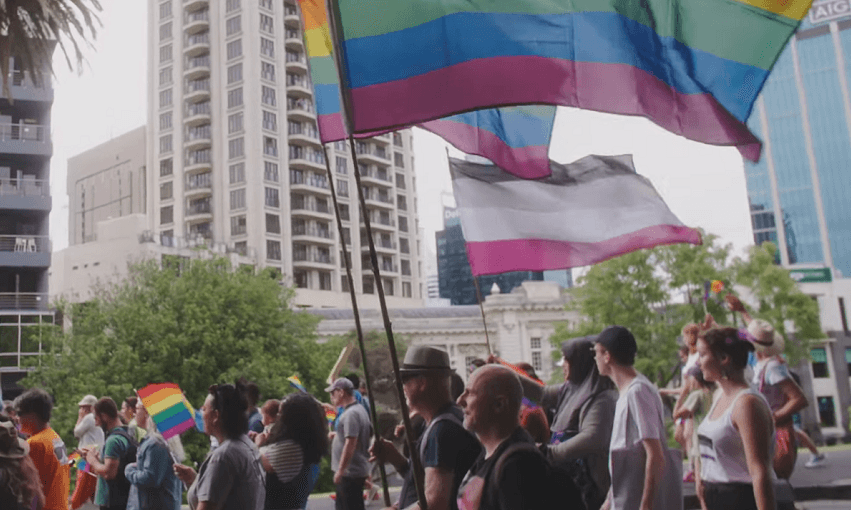Endless misconceptions exist about people who identify as ‘ace’, and filmmaker Julie Zhu wants to clear some of them up in Frame documentary Ace of Hearts.
“Bisexuality used to be ‘the invisible sexuality’, but now I feel like asexuality is. I see people in the LGBT community saying it’s not part of the LGBT spectrum.”
“People think asexuality is some sort of deficiency, like your hormones aren’t working, or that you have a problem that can be fixed.”
“I don’t tell many people because I don’t want people to not believe me. People say it’s just a label people put on themselves when they’ve been single a long time.”
“You not only have to come out to people, you have to explain what you are too which means there’s a whole other level of responsibility. I think asexuality is similar to bisexuality where people say it’s not queer enough and you’re not really part of the community which really grinds my gears because to be asexual is to inherently be queer.”
These are just some of the thoughts shared by people who responded to the documentary callout for Ace of Hearts.
Sexuality is not a straight line from homosexuality to heterosexuality, and nor is there a straight line between asexuality and allosexuality – the term used for someone who experiences sexual attraction. There are inconsistencies, interruptions, conflicts, and many people find themselves identifying within the grey. An asexual person is defined by AVEN (Asexuality Visibility and Education Network) as “a person who does not experience sexual attraction”, but the website also acknowledges that “there is a broad spectrum between end points of ‘asexual’ and ‘very sexual’ with differing levels of sexuality.”
The spectrum of asexuality can include greysexual (those who only experience sexual attraction rarely or at a very limited level), demisexuality (those who only experience sexual attraction after an emotional bond is formed), akiosexual (having sexual/romantic feelings but not wanting to act or having those feelings reciprocated), aegosexual (those who may get aroused by sexual content but do not desire a sexual relationship for themselves in real life), and many more. There can be sex-repulsed, sex-neutral, and sex-favourable aces.
There is also a split between sexual attraction and romantic attraction. People may feel romantically attracted to certain people but not sexually attracted, or vice versa. People may identify as aromantic (not feeling romantic attraction towards anyone), heteroromantic (feeling romantic attraction towards people of the opposite gender), homoromantic (feeling romantic attraction towards people of the same gender), panromantic (feeling romantic attraction to people irrespective of gender), and so on.
It’s entirely possible to be ace and not know the terminology. It’s also possible to know the terminology and still not know if it applies to you. In fact, a defining part of asexuality seems to be questioning whether you are. Online ace forums are full of questions from people wondering whether asexuality and the spectrum it encompasses is for them. Generally, the answers on forums are incredibly supportive and welcoming. There is little gatekeeping and anyone who finds the labels helpful in any way is welcome to them. It’s also fine to identify with the labels for a period and then move on. Nothing delegitimises you, and no one is forced to stick to the same labels forever.
Still, it’s easier to say in certain contexts than others that I feel queer, ace, or on the asexual spectrum. In other contexts, all the self-doubt and questioning will come flooding back. Am I just making this up? How can I know for sure how I feel? Am I making a big deal out of something that really doesn’t impact my life that much? Will I one day feel differently and all of this will feel like a mistake to have talked about?
Making this documentary has helped with that. Having the initial research conversations with the people who responded to the callout was eye-opening and validating. So many stories and experiences felt relatable, and it was hard to only hone in on a few voices to highlight.
Within this documentary, there are asexual voices, aromantic voices, demisexual, panromantic, heteroromantic, gay, queer, takatāpui, non-binary, and trans voices. There are people in relationships, people with kids, people with disabilities. All of this serves to show that there’s not just one model of what asexuality looks like.
These individuals have complex lives with a range of different passions, and most said that being on the ace spectrum wasn’t the defining element of their lives – a lack of something rarely is. And maybe that’s the reason the “ace community”, more than most communities, exists less cohesively and less collected as a “community”. Particularly in Aotearoa, ace communities are small and mostly online. Some Facebook groups exist but with shifting seasons of activity and lull.
By making this documentary I wanted to emphasise the fluidity and spectrum of sexuality – that it’s not a binary of asexual or allosexual, that love can be valid in multiple other forms, that a progressive sex-positive society can and should make room for those who tend to find sex less relevant too.
And it does feel like ace discourse is gaining momentum and visibility. In her recent book Ace: What Asexuality Reveals About Desire, Society, and the Meaning of Sex, journalist Angela Chen argues that ace liberation could help everyone by deconstructing sexual and romantic normativity. Aces want the borders of sexualities to be broken, to be malleable, and everyone can benefit from this fluidity.
Whether you identify or present as straight, fluid, queer, asexual, allosexual, the breaking down of rigidity and binaries can be freeing for everyone.
Frame is a series of short, standalone documentaries produced by Wrestler for The Spinoff. Watch more here.
Made with support from NZ On Air.
